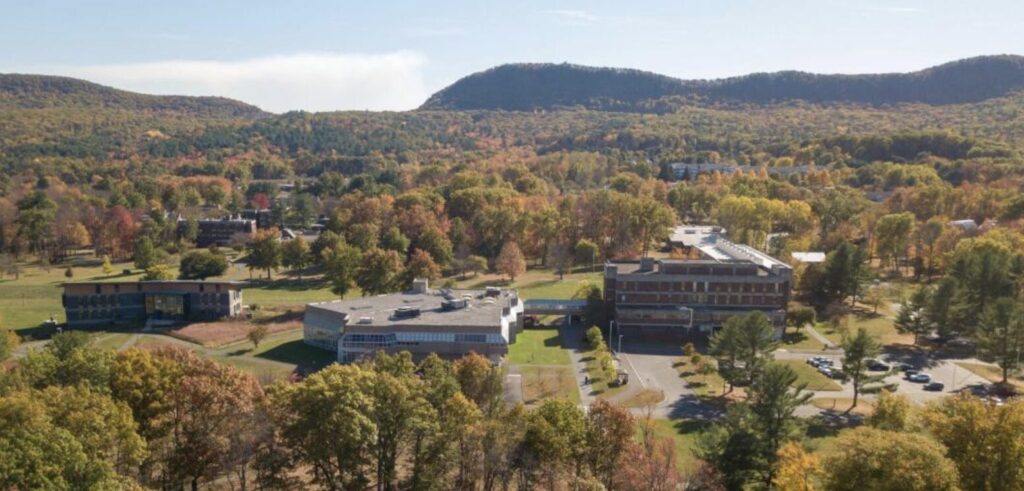Opinion: A Strong Hampshire College Future Requires Transparency

Hampshire College. Photo: hampshire.edu

On January 6 of this year, President Ed Wingenbach announced his resignation as leader of Hampshire College. He had led the institution through a seemingly miraculous rebound since 2019. Behind the handshakes and smiles, a complex reality exists, and the community must rally once again to save the college. High-stakes questions about a potentially important bond issue loom large.
Flashback
Rewind to January of 2019: President Mim Nelson made the bombshell announcement that Hampshire was seeking a strategic partner and might not accept a class of incoming students for the fall. Nelson’s administration believed they couldn’t raise more money due to “donor fatigue”. The search for a strategic partner had started in secret the previous semester. That search, followed by the abrupt announcement, was a panicked response to enrollment and budgetary problems that they could have resolved in more sensible ways.
Believing Nelson’s actions would lead to a death spiral for the college, the community rallied, including through the second-longest college sit-in in U.S. history, alumni fundraising campaigns, and the formation of a re-envisioning coalition. Nelson and other senior leaders departed, and the remaining board members pledged to fundraise and maintain the college’s independence. They hired President Wingenbach in August of 2019, and progress was made in fundraising, rebuilding enrollment, and implementing curricular changes, despite the additional challenges posed by the pandemic.
Wingenbach’s email to alumni in June 2024 explained that enrollment was under projections for 2024-25, but the college would remain sustainable at that level. Some out-of-the-box ideas for improving enrollment have yet to be adopted. In a recent interview with Leapfrog, a student publication at Hampshire, Wingenbach said Hampshire is not at risk. He didn’t disclose that the college has had trouble with its bonds.
The Bond Issue
Hampshire’s audited financial report for fiscal year 2023-24 (which is publicly available) discloses that it violated stipulations over the last few years on two series of bonds that total over $21 million and almost $9 million of that is due on September 30, 2025 (just 60 days after Wingenbach’s last day at Hampshire). The report admits that the college doesn’t have the funds to pay the bonds and is in danger of losing its good standing unless it continues to get extensions or obtains refinancing. Others have revealed this bond matter on Reddit.
Hampshire provided one document I requested, and declined my other requests. A letter from the college’s accreditor, the New England Commission for Higher Education (NECHE), dated October 7, 2024, mentions that the college’s consultants believe that the bond market for colleges similar to Hampshire is improving and that investors who believe in Hampshire will take steps towards refinancing the bonds.
In March 2025, Moody’s, the national bond rating agency, downgraded its rating of the Higher Ed sector, stating that, “Potential disruptions to federal financial aid disbursement, however, would impact all colleges and universities…only a select group of wealthy institutions have the financial flexibility to manage such a scenario without likely seeing steep enrollment decline.” according to Inside Higher Ed.
I contacted the college spokesperson and its CFO to inquire about the status of the bonds. I inquired several more times and heard back for the first time shortly before press time. The response was brief, but it included some explanation and their assessment that the college is in the best financial shape it has been in for at least a decade.
I reached out to Ken Rosenthal, former interim president and one of the college’s founders. He was confident about Hampshire’s future, including the bond issue, in part because Hampshire has always weathered these storms, Hampshire alumni and the Five Colleges will not let Hampshire fail, and in the next decade or so, Hampshire is likely to receive more bequests.
While it’s possible that bond issuers will continue to provide extensions, it’s imperative that the college conduct a risk assessment for this perilous period in higher education, be transparent, and consider a more proactive strategy for mitigating that risk.
Solutions for the Bond Problem
To significantly reduce the college’s risk, I propose an immediate campaign to raise $10 million for a cash reserve by September 30, 2025, above and beyond Hampshire’s current fundraising campaign for operating expenses. In August 2024, the International Review of Financial Analysis reviewed thirty-seven years of data to confirm that for-profit firms that increased their cash holdings got better deals from bond investors. This strategy should work similarly for Hampshire, a non-profit, putting it in a far stronger position for negotiating another extension, attracting new bond issuers at a reasonable rate or payback period, or partially paying off the bond.
Hampshire has made significant strides in rebuilding its fundraising efforts, but a grassroots initiative is needed to augment the college’s efforts and meet the higher targets. During the 2019 crisis, alumni were able to raise millions in pledges without any paid staff or official college resources. While there has recently been some increase in efforts to include alumni through a program called Hampshire Open Network, an all-out effort beyond what they have the authority to undertake is needed.
I believe alumni will rally once again, realizing the urgency of saving the college in time for the college’s 55th Anniversary this Fall and as a needed antidote to the Trump era. A more inclusive approach will also encourage more people to donate. I have donated to the current campaign and encourage others who care about Hampshire to do the same.
However, for true Hampshire sustainability, we need more. We need more donations, higher enrollment, but most of all, we need more transparency into fundraising, governance, and decision-making. We need a fully inclusive community process to discuss what went wrong in 2019 and to make sure we reform the presidential search process to reflect this long-deferred shared understanding. Board Reform and what Hampshire needs in its next president are covered in the forthcoming article in The Omen, titled “Is Hampshire Still Hampering Good Governance?“ The re-envisioning of Hampshire that students fought for includes governance reform– we must never forget that.
Jonathon Podolsky is moderator of Local Frogs: Hampshire College Alumni of Western MA, a certified non-profit board consultant, and a Journalist Member of the Education Writers Association.
